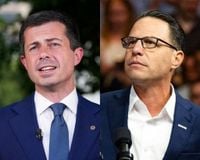Kamala Harris, the former vice president and 2024 Democratic presidential nominee, is making waves with her forthcoming memoir, "107 Days," scheduled for release on September 23, 2025. The book, which has already generated significant buzz in political circles, offers an unvarnished account of the tumultuous 2024 election cycle and Harris’s candid reflections on her party’s leadership, her choices, and the pressures she faced at the highest levels of American politics.
According to reporting by Fox News Digital, The Guardian, and Politico, Harris’s memoir pulls back the curtain on the fraught months after President Joe Biden’s disastrous debate performance and subsequent withdrawal from the race. Harris, thrust unexpectedly into the role of standard bearer, recounts both the personal and political calculations that shaped her campaign—and, in the process, doesn’t shy away from criticizing a number of her Democratic colleagues.
One of the most talked-about revelations in "107 Days" is Harris’s consideration of former Secretary of Transportation Pete Buttigieg as her running mate. Harris writes, as quoted by The Atlantic and cited by Fox News Digital, that Buttigieg “would have been an ideal partner—if I were a straight white man.” She elaborates: “But we were already asking a lot of America: to accept a woman, a Black woman, a Black woman married to a Jewish man. Part of me wanted to say, Screw it, let’s just do it. But knowing what was at stake, it was too big of a risk. And I think Pete also knew that—to our mutual sadness.”
The decision ultimately led Harris to select Minnesota Governor Tim Walz as her vice-presidential pick. DNC Vice Chair Shasti Conrad, who spoke with Fox News Digital ahead of the memoir’s release, defended the choice, describing Walz as a “happy warrior” who could “speak the language of the working class.” Conrad added, “Personally, I thought that, you know, Gov. Walz was a fantastic running mate for her. And when I met him last year, I jokingly said that we'd grown him in a lab, because he really felt to me like perfect for the moment.”
Buttigieg, for his part, was “surprised” by Harris’s characterization. Speaking to Politico during a ribbon-cutting in Indiana, he said, “My experience in politics has been that the way that you earn trust with voters is based mostly on what they think you’re going to do for their lives, not on categories. I wouldn’t have run for president [in 2020] if I didn’t believe that.” Buttigieg’s response, reported across multiple outlets, underscores ongoing debates within the Democratic Party about identity, electability, and the risks of challenging entrenched assumptions about the American electorate.
Harris’s memoir doesn’t stop with Buttigieg. As detailed by Politico, she offers pointed critiques of several prominent Democrats who are themselves considered likely 2028 presidential contenders. California Governor Gavin Newsom, a longtime friend and rival, is called out for his lack of immediate support after Biden’s withdrawal. Harris writes that Newsom texted “Hiking. Will call back,” but, as she notes dryly, “He never did.” Michigan Governor Gretchen Whitmer, meanwhile, is described as reticent to endorse Harris right away, telling her she needed to “let the dust settle” before making a public statement. Whitmer did eventually co-chair Harris’s campaign.
Illinois Governor JB Pritzker, hosting the Democratic National Convention, also hesitated, telling Harris he “can’t commit” initially but endorsed her the following day. These anecdotes, presented with Harris’s characteristic bluntness, paint a picture of a party struggling to find unity and direction in the face of unprecedented political challenges.
Perhaps the most sensitive topic in "107 Days" is Harris’s handling of President Biden’s declining ability to campaign. Pennsylvania Governor Josh Shapiro, another runner-up for Harris’s vice-presidential slot, has publicly criticized Harris for not speaking out sooner about Biden’s struggles. In an interview with Stephen A Smith, as reported by The Guardian, Shapiro remarked, “She’s going to have to answer to how she was in the room and yet never said anything publicly.”
Harris, for her part, acknowledges her internal conflict. She writes, “Of all the people in the White House, I was in the worst position to make the case that he should drop out,” fearing that such a move would be seen as “incredibly self-serving” and “poisonous disloyalty.” Harris draws a distinction between Biden’s ability to govern and his ability to campaign, describing his decision to run for a second term as “reckless.” She adds, “The stakes were simply too high.”
Shapiro, reflecting on the 2024 campaign, said he had been “very vocal” with Biden and his staff about his concerns, telling them directly that he questioned Biden’s fitness for another term. He also highlighted his own strategy for countering Donald Trump, emphasizing unity: “Some people would say that the only way to deal with it is to fight fire with fire, to replicate his behavior to some degree,” Shapiro told Smith. “But I was direct with them. I told them my concerns.”
Harris’s account of the vice-presidential selection process is equally unsparing. She describes Shapiro as “poised, polished and personable,” but ultimately too ambitious for the No. 2 role, noting his questions about the vice president’s residence and the possibility of displaying Pennsylvania art from the Smithsonian. Harris bluntly told him, “A vice president is not a copresident.” Shapiro’s spokesperson dismissed Harris’s characterization, telling Politico it was “simply ridiculous to suggest that Governor Shapiro was focused on anything other than defeating Donald Trump and protecting Pennsylvania from the chaos we are living through now.”
Arizona Senator Mark Kelly, another contender, is described as “magnetic” and “an American ideal of selfless service,” but Harris questioned whether he was prepared for the brutal attacks likely to come from Trump, especially given his limited exposure to high-stakes political crises.
Harris also turns her critical gaze inward, recounting her frustration at having to “prove my loyalty, time and time again” to Biden, while feeling that the White House did little to defend her against attacks from Republicans and the conservative media. She writes, “Getting anything positive said about my work or any defense against untrue attacks was almost impossible.” Harris claims Biden’s inner circle marginalized her as her profile grew, assigning her politically fraught tasks and failing to push Biden to step aside sooner. She recalls, “’It’s Joe and Jill’s decision.’ We all said that, like a mantra, as if we’d all been hypnotized.”
Despite the rawness of her critique, Harris maintains that her relationship with Biden was built on “genuine” shared values, even as she laments the lack of reciprocal loyalty. She describes the president as “old,” noting his “physical and verbal stumbles,” but insists there was a distinction between his ability to govern and to campaign, writing that he “navigated successfully through intensely dangerous world events.”
The release of "107 Days" is already reshaping the conversation about Democratic leadership and the future of the party. With Harris, Buttigieg, Shapiro, Newsom, and others all considered potential 2028 contenders, the memoir’s frank assessments and personal recollections are sure to fuel debate—and perhaps, some soul-searching—among Democrats as they look to rebuild after a bruising defeat.
As the party’s next generation jockeys for position, Harris’s willingness to “speak her truth,” as Shasti Conrad put it, signals a new, more open era of Democratic introspection. Whether that candor helps heal old wounds or deepens divisions remains to be seen, but one thing is certain: the battle for the soul of the Democratic Party is far from over.





